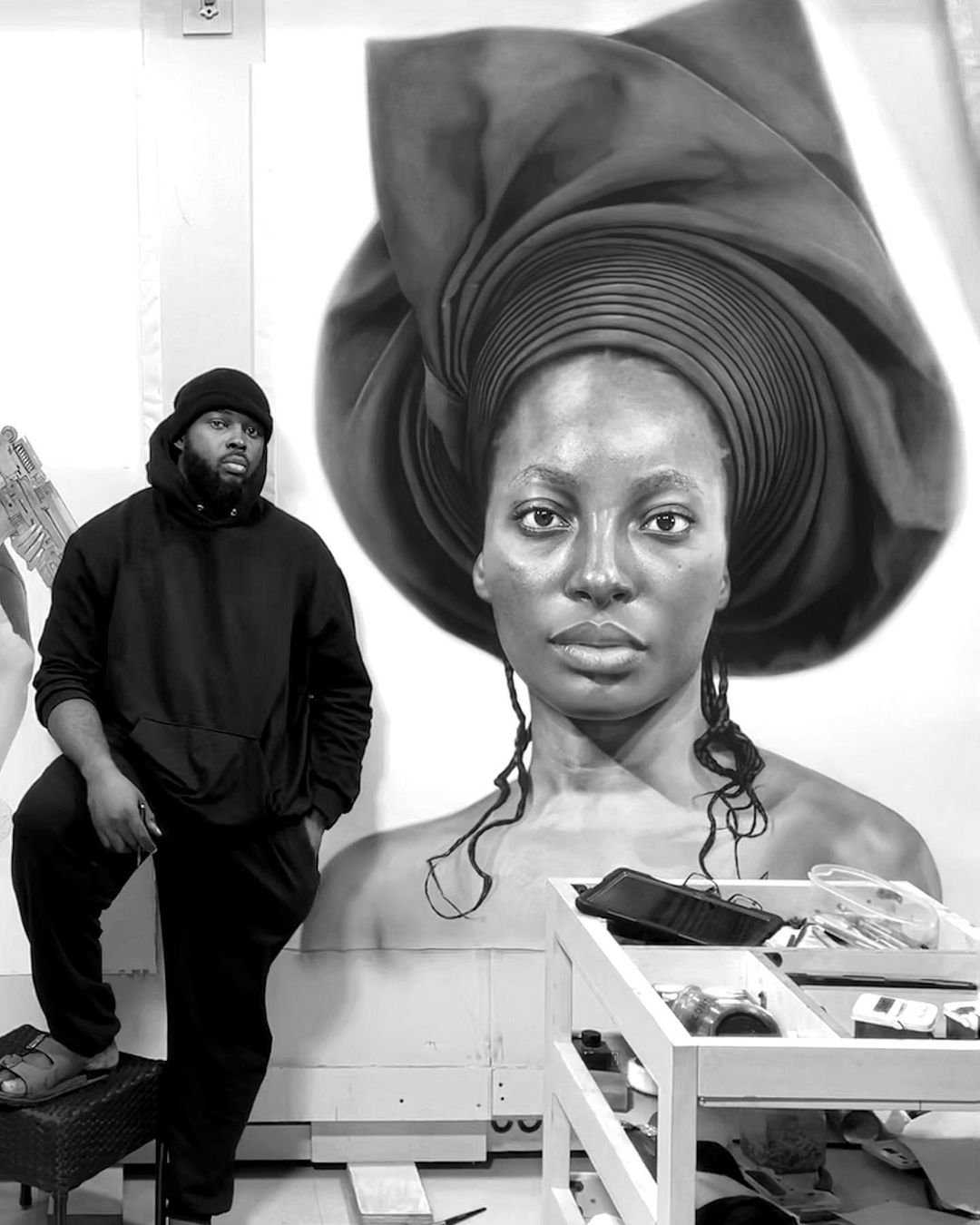Creating Despite Adversity: The Resilience of Nigerian Artists
Art by artmonnk
Ever wondered what it's like to be an artist in Nigeria? You have passion and talent in spades but face overwhelming odds. The economy is weak, funding is scarce, materials cost a small fortune, and government support is little to none. Yet against all adversity, Nigeria's art scene is thriving.
You hustle each day to get by but never stop creating. Because you have a gift, a calling, a story to share with the world through your art. No matter the medium - visual arts, music, literature, theatre - you find a way to make it happen. Out of grit, ingenuity and a whole lot of jollof rice, you build your own platforms to showcase your work. You collaborate, innovate and support each other in a vibrant community of creators.
The outside world is starting to take notice of the resilience and dynamism in Nigeria's arts. But you've known for a long time what you're capable of in the face of challenges. You just needed the rest of us to catch up. This is a story of how Nigerian artists get it done. How creativity thrives against all odds. How art is life.
The Difficulty Making a Living as an Artist in Nigeria
As an artist in Nigeria, making a living from your craft alone can be incredibly difficult.
There is little government support or funding for the arts. Grants and fellowships are scarce, leaving many artists to finance projects out of their own pockets.
Piracy and intellectual property theft are rampant. Unauthorized copies of creative works are frequently sold, with the original artists receiving no compensation. For visual artists, seeing your work reproduced and sold without permission is frustratingly common.
Many Nigerians still don't view the arts as a viable career path. Families often pressure artists to pursue "more serious" professions. This lack of social support, combined with financial struggles, leads some artists to abandon their craft altogether.
However, Nigerian artists are remarkably resilient. Despite these obstacles, the country has a thriving arts scene. Creators find ways to produce work, build audiences, and forge careers. Some strategies include:
Developing multiple income streams. Teaching, freelancing, and participating in artist residencies allow creators to finance their art.
Tapping into global networks. Social media and international collaborations provide exposure and open up new opportunities. The global demand for contemporary African art also helps.
Fostering community support. Artists band together, promoting each other's work and creating platforms to showcase art. They support one another in an environment where that support is often lacking.
The determination of Nigerian artists in the face of considerable challenges is inspiring. Their perseverance fosters a vibrant creative culture and contributes to the country's economy and international prestige. While government and societal support may be slow to materialize, artists will undoubtedly continue creating despite adversity.
Lack of Government Support for the Arts in Nigeria
The Nigerian government provides little support for artists and the arts. This lack of funding and resources has made it extremely difficult for creatives to thrive.
Lack of Grants and Sponsorships
There are few government grants, sponsorships or funding programs available for artists. The little funding that exists is poorly distributed and difficult to access. Most artists struggle to find any financial backing, forcing many to work other jobs to support themselves.
Inadequate Arts Education
Arts education in Nigeria is severely underfunded. Most schools have no formal arts education, leaving new generations of potential artists with limited opportunities to develop their talents. The few existing arts programs are poorly equipped. This lack of training and exposure at an early age contributes to the struggle many artists face.
Limited Resources and Infrastructure
Nigerian artists lack access to resources that artists in other countries take for granted. There are few well-equipped studios, gallery spaces, performance venues or rehearsal spaces. The cost of art supplies and production equipment is often prohibitive. Print and digital media provide little coverage or promotion of the arts.
While the Nigerian government's lack of support for the arts has posed immense challenges, the resilience of Nigerian artists is inspiring. Despite facing adversity, artists have persevered, creating and sharing their work with passion and innovation. Greater government funding and recognition of the value of art are still desperately needed to help this vital community thrive. The world has much to gain from a flourishing arts scene in Nigeria.
Persisting Despite Limited Resources and Training
Despite the struggles of being an artist in Nigeria, many persist in honing their craft and creating impactful works of art. With limited resources and access to formal training, Nigerian artists have had to be resourceful.
You likely have to get creative to acquire materials, especially if you can’t afford expensive supplies. Some artists make their own paints and brushes. Others incorporate found or recycled objects into their work. When resources are scarce, imagination and ingenuity become your most valuable tools.
Formal education in art may be difficult to obtain, as there are few art schools or universities offering programs. Many artists are self-taught or learn skills through apprenticeships and mentorships. While the path is harder without instruction, it allows for a truly original development of style and voice.
Art communities also provide support. By connecting with other artists, sharing knowledge, and collaborating, you can gain valuable experience. These relationships help combat the isolation many artists face. They provide encouragement and allow you to promote each other's work, which is vital when trying to build an audience and sell pieces.
Despite the challenges, Nigerian artists persevere in creating impactful, evocative works of art. Their resilience and resourcefulness in the face of adversity make their contributions to the global arts community all the more meaningful and inspiring. By coming together and supporting one another, artists are able to thrive even when circumstances are far from ideal. Their ingenuity and imagination, rather than any lack of training or supplies, are the true heart of their craft.
Finding Inspiration Through Community and Culture
The arts community in Nigeria faces many struggles, yet artists continually find inspiration through connecting with each other and embracing their cultural heritage.
Building a Support Network
Forming connections with other artists provides motivation and strength during difficult times. By collaborating on projects, sharing resources, and promoting each other's work, Nigerian artists are able to lift each other up. These mutually beneficial relationships allow creativity to thrive even when faced with adversity.
Art collectives and organizations also play an important role in fostering community. Groups like the Guild of Fine Artists, Musical Society of Nigeria, and Society of Nigerian Artists have provided platforms for artists to come together, exchange ideas, and gain visibility since the mid-20th century. Today, organizations like Art X Lagos and the Yinka Shonibare Foundation continue this tradition. They create spaces where artists can commune, collaborate, and celebrate their craft.
Honoring Cultural Roots
Nigerian artists also find inspiration by exploring themes related to their cultural heritage in their work. Traditions, folklore, music, textiles, and other elements of Nigerian culture have influenced and inspired artists for generations. By incorporating these familiar cultural touchpoints into their art, Nigerian creators are able to forge a connection with their roots and share the diversity of Nigerian culture with the world.
Contemporary artists like Njideka Akunyili Crosby, Yinka Shonibare CBE, and Ndidi Dike incorporate traditional Nigerian patterns, textiles, and motifs into their mixed media works. Musicians fuse indigenous rhythms and instruments with popular genres like Afrobeat, hip hop, and R&B. Poets and authors reimagine Nigerian folk tales and translate them for modern audiences. By honoring their cultural heritage in these ways, Nigerian artists affirm their identity and share it with global audiences.
The Future of Art in Nigeria
The future of art in Nigeria remains uncertain but promising. While the struggle is real for up and coming artists, the resilience of Nigerian creatives gives hope.
A New Generation of Artists
A new wave of Nigerian artists are emerging, using social media to promote their work and gain international recognition. These digitally-savvy artists are able to connect with art lovers around the world, sell their work on global platforms, and gain commissions from international clients. Artists like Njideka Akunyili Crosby, Toyin Ojih Odutola, and Peju Alatise have found success and acclaim, raising the profile of contemporary Nigerian art.
There are also grassroots art movements sprouting up, like the Alára (Àlàrà) collective, using art to celebrate Yoruba culture and address social issues. These genre-bending collectives are creating spaces for experimental work that challenges conventions. Their DIY attitude and multidisciplinary approach is pioneering a new avant-garde in Nigerian art.
Improving Infrastructure and Policy
For art to thrive, artists need infrastructure and policy support. There have been calls for the government to invest in art education, public art programs, grants, and cultural funding. Updating intellectual property laws and improving freedom of expression policies could also help artists create and distribute work without fear of censorship or copyright issues.
Private institutions and non-profits are also stepping in to fill the gaps. Art centers like the Center for Contemporary Art in Lagos provide resources for artists and curators. Residency programs offer artists spaces to live, work, and collaborate. These initiatives are creating an environment where art can be nurtured, even without strong government support.
While art in Nigeria still struggles, young artists are breaking through borders using technology and building communities to uplift each other. With improved infrastructure and policy changes, art can transform into a leading industry in Nigeria. The future remains unknown but with determination and ingenuity, Nigerian artists will continue creating despite adversity.
Conclusion
So there you have it. Despite economic hardship and lack of government support, Nigerian artists continue to persevere in creating impactful work. Their resilience in the face of adversity is inspiring. Though the path is difficult, these artists show that creativity and passion can thrive even under strain. The next time you feel unmotivated or discouraged in your own creative pursuits, think of these Nigerian artists and let their determination fuel your own. Keep creating, keep putting in the work each day, and don't lose hope. With enough persistence, you too can achieve great things. The arts live on in Nigeria, fueled by the dedication of its artists. What an amazing reminder of the power of human creativity against all odds.

